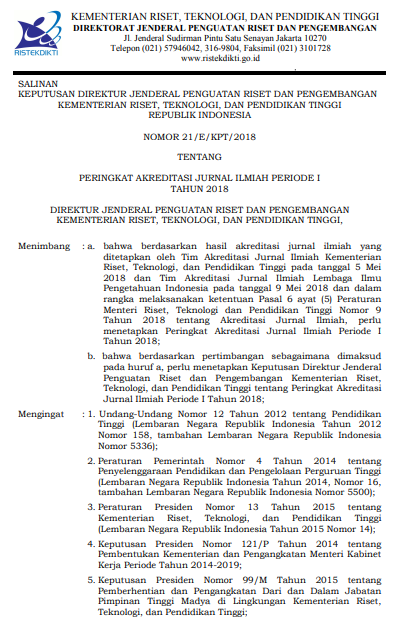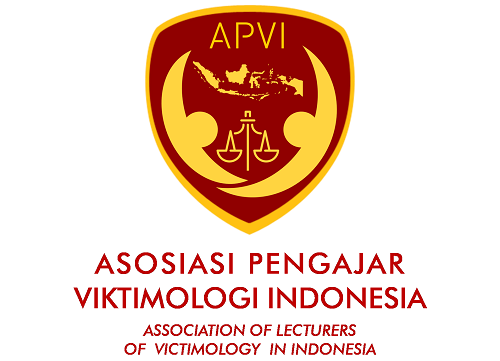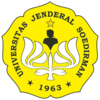- Focus and Scope
- Section Policies
- Peer Review Process
- Publication Frequency
- Open Access Policy
- Archiving
- Screening Plagiarism
- Publication Ethics
Focus and Scope
(Focus and scope) Jurnal Dinamika Hukum (JDH) is an open access and peer-reviewed journal that aims to offer an international academic platform for cross-border legal research in multiple governance policies and civil rights law, particularly in developing and emerging countries. These may include but are not limited to various fields such as:
1. Civil Law;
2. Criminal Law;
3. Constitutional and Administrative Law;
4. Air and Space Law;
5. Customary Institution Law;
6. Religious Jurisprudence Law;
7. International Regime Law;
8. Legal Pluralism Governance; and
9. Another section related to contemporary issues in legal scholarship.
Section Policies
Preface
Articles
Peer Review Process
Editor-in-Chief will assign the manuscript to Managing Editor for further handling. The Managing Editor have a right to directly accept, reject, or review according to the standard set up. Prior to further processing steps, a plagiarism check using Turnitin is applied for each manuscript. Then, the Managing Editor will request at least two scientists to review the research article manuscript. To uphold rigorous academic standards, all submitted manuscripts undergo a double-blind peer review process. This means that the identities of both the reviewers and authors are kept confidential from each other throughout the review process.
The results of the review will provide consideration to decide whether the manuscripts should be accepted, revised, or rejected. The aspects that will be assessed by the reviewers are the originality of the articles, clarity of presentation, and contribution to the field.
Regarding the acceptance of the manuscripts, the following are decisions provided:
Pre-Review Stage:
- Rejected: Manuscripts do not suitable with scope, template, author guideline, or exceed editorial capacity to process.
- Revision Required: The manuscript requires improvement (revision) based on editor comments.
Review Stage:
- Revision Required: The manuscript requires improvement (revision) based on editor comments.
- Declined: Authors do not revise within the editorially specified time, including any additional time tolerated by the editor. Authors also do not revise based on the comments of editors and reviewers, but do not provide rational comments on why the comments are not actionable.
- Accepted: The authors have revised the manuscript according to the Editor's expectations by considering the suitability of the revisions to the Editor's and Reviewers' comments.
Copy-Editing Stage:
The author will be asked to check the layout of the manuscript that has been done by the Managing Editor, this stage may ask for further revisions that are confirmation of information (if needed).
Production Stage
The Managing Editor publishes the manuscript as an article in the designated Edition. Authors will be informed via email and OJS will record it as archived, the Managing Editor then activates the DOI through the Journal Team managed by Universitas Jenderal Soedirman.
Publication Frequency
Jurnal Dinamika Hukum (JDH) is published three times a year, in January, May, and September.
Open Access Policy
Readers have right to read, download, copy, distribute, print, search, or link to the full texts of all articles in Jurnal Dinamika Hukum. This journal provides immediate open access to its content on the principle that making research freely available to the public supports a greater global exchange of knowledge.
Archiving
This journal utilizes the LOCKSS system to create a distributed archiving system among participating libraries and permits those libraries to create permanent archives of the journal for purposes of preservation and restoration. More...
Screening Plagiarism
Plagiarism screening will be conducted by Jurnal Dinamika Hukum Editorial Board using Turnitin.
Publication Ethics
Jurnal Dinamika Hukum (Jurnal Dinamika Hukum - JDH) has high standards for expected ethical behavior by all parties involved in the act of publishing: the author, the journal editor, the peer reviewer and the publisher. JDH is a peer-reviewed journal, published three times a year by Faculty of Law Jenderal Soedirman University. It is available online as open access sources as well as in print. This statement clarifies the ethical behavior of all parties involved in the act of publishing an article in this journal, including the author, the editor-in-chief, the Editorial Board, the reviewer, and the publisher. This statement is based on COPE Best Practice Guidelines for Journal Editors and Peraturan LIPI No 5 Th 2014
Ethical Guideline for Journal Publication
The publication of an article in JDH is an essential building block in the development of a coherent and respected network of knowledge. It is a direct reflection of the quality of the work of the authors and the institutions that support them. Peer-reviewed articles support and embody the scientific method. It is, therefore, important to agree upon standards of expected ethical behavior for all parties involved in the act of publishing: the author, the journal editor, the peer reviewer, the publisher, and the society.
Faculty of Law Jenderal Soedirman University as the publisher of JDH takes its duties of guardianship over all stages of publishing extremely seriously, and we recognize our ethical and other responsibilities. We are committed to ensuring that advertising, reprint or other commercial revenue has no impact or influence on editorial decisions. Editorial Board will assist in communications with other journals and/or publishers where this is useful and necessary.
Allegations of Research Misconduct
Research misconduct means fabrication, falsification, citation manipulation, or plagiarism in producing, performing, or reviewing research and writing an article by authors, or in reporting research results. When authors are found to have been involved with research misconduct or other serious irregularities involving articles that have been published in scientific journals, Editors have a responsibility to ensure the accuracy and integrity of the scientific record.
In cases of suspected misconduct, the Editors and Editorial Board will use the best practices of COPE to assist them to resolve the complaint and address the misconduct fairly. This will include an investigation of the allegation by the Editors. A submitted manuscript that is found to contain such misconduct will be rejected. In cases where a published paper is found to contain such misconduct, a retraction can be published and will be linked to the original article.
The first step involves determining the validity of the allegation and an assessment of whether the allegation is consistent with the definition of research misconduct. This initial step also involves determining whether the individuals alleging misconduct have relevant conflicts of interest.
If scientific misconduct or the presence of other substantial research irregularities is a possibility, the allegations are shared with the corresponding author, who, on behalf of all of the co-authors, is requested to provide a detailed response. After the response is received and evaluated, additional review and involvement of experts (such as statistical reviewers) may be obtained. For cases in which it is unlikely that misconduct has occurred, clarifications, additional analyses, or both, published as letters to the editor, and often including a correction notice and correction to the published article are sufficient.
Institutions are expected to conduct an appropriate and thorough investigation of allegations of scientific misconduct. Ultimately, authors, journals, and institutions have an important obligation to ensure the accuracy of the scientific record. By responding appropriately to concerns about scientific misconduct, and taking necessary actions based on evaluation of these concerns, such as corrections, retractions with replacement, and retractions, JDH will continue to fulfill the responsibilities of ensuring the validity and integrity of the scientific record.
Publication decisions
The editors of JDH are responsible for deciding which of the articles submitted to the journal should be published. The editors may be guided by the policies of JDH editorial board and constrained by such legal requirements as shall then be in force regarding libel, copyright infringement and plagiarism. The editor may confer with other editors or reviewers in making publication decisions.
Complaints and Appeals
JDH will have a clear procedure for handling complaints against the journal, Editorial Staff, Editorial Board or Publisher. The complaints will be clarified to a respected person with respect to the case of complaint. The scope of complaints includes anything related to the journal business process, i.e. editorial process, found citation manipulation, unfair editor/reviewer, peer-review manipulation, etc. The complaint cases will be processed according to COPE guideline. The complaint cases should be sent by email to: jurnal.dinamikahukum@gmail.com .
Fair play
An editor at any time evaluate manuscripts for their intellectual content without regard to race, gender, sexual orientation, religious belief, ethnic origin, citizenship, or political philosophy of the authors.
Confidentiality
The editor and any editorial staff must not disclose any information about a submitted manuscript to anyone other than the corresponding author, reviewers, potential reviewers, other editorial advisers, and the publisher, as appropriate.
Disclosure and conflicts of interest
Unpublished materials disclosed in a submitted manuscript must not be used in an editor's own research without the express written consent of the author.
Duties of Authors
1. Reporting standards:
Authors of reports of original research should present an accurate account of the work performed as well as an objective discussion of its significance. Underlying data should be represented accurately in the paper. A paper should contain sufficient detail and references to permit others to replicate the work. Fraudulent or knowingly inaccurate statements constitute unethical behaviour and are unacceptable.
2. Data Access, Retention and Reproducibility:
Authors are asked to provide the raw data in connection with a paper for editorial review, and should be prepared to provide public access to such data, if practicable, and should in any event be prepared to retain such data for a reasonable time after publication. Authors are responsible for data reproducibility.
3. Originality and Plagiarism:
The authors should ensure that they have written entirely original works, and if the authors have used the work and/or words of others that this has been appropriately cited or quoted.
4. Multiple, Redundant or Concurrent Publication:
An author should not, in general, publish manuscripts describing essentially the same research in more than one journal or primary publication. Submitting the same manuscript to more than one journal concurrently constitutes unethical publishing behaviour and is unacceptable.
5. Acknowledgement of Sources:
Proper acknowledgement of the work of others must always be given. Authors should cite publications that have been influential in determining the nature of the reported work.
6. Authorship and Contributorship of the Article:
Authorship should be limited to those who have made a significant contribution to the conception, design, execution, or interpretation of the reported study. All those who have made significant contributions should be listed as co-authors.
Where there are others who have participated in certain substantive aspects of the research project, they should be acknowledged or listed as contributors.
The corresponding author should ensure that all appropriate co-authors and no inappropriate co-authors are included on the paper and that all co-authors have seen and approved the final version of the paper and have agreed to its submission for publication.
7. Disclosure and Conflicts of Interest:
All authors should disclose in their manuscript any financial or other substantive conflicts of interest that might be construed to influence the results or interpretation of their manuscript. All sources of financial support for the project should be disclosed.
8. Fundamental errors in published work:
When an author discovers a significant error or inaccuracy in his/her own published work, it is the author’s obligation to promptly notify the journal editor or publisher and cooperate with the editor to retract or correct the paper.
9. Hazards and Human or Animal Subjects:
If the research work involves chemicals, human, animals, procedures or equipment that have any unusual hazards inherent in their use, the author must clearly identify these in the manuscript in order to obey ethical conduct of research using animals and human subjects. If required, Authors must provide legal ethical clearance from association or legal organization.
If the research involves confidential data and of business/marketing practices, authors should clearly justify this matter whether the data or information will be hidden securely or not.
Duties of Editors
1. Fair Play
An editor at any time evaluates manuscripts for their intellectual content without regard to race, gender, sexual orientation, religious belief, ethnic origin, citizenship, or political philosophy of the authors.
2. Confidentiality
The editor and any editorial staff must not disclose any information about a submitted manuscript to anyone other than the corresponding author, reviewers, potential reviewers, other editorial advisers, and the publisher, as appropriate.
3. Disclosure and Conflicts of Interest
Unpublished materials disclosed in a submitted manuscript must not be used in an editor's own research without the express written consent of the author.
4. Publication Decisions
The editor board journal is responsible for deciding which of the articles submitted to the journal should be published. The validation of the work in question and its importance to researchers and readers must always drive such decisions. The editors may be guided by the policies of the journal's editorial board and constrained by such legal requirements as shall then be in force regarding libel, copyright infringement and plagiarism. The editors may confer with other editors or reviewers in making this decision.
5. Review of Manuscripts
The editor must ensure that each manuscript is initially evaluated by the editor for originality. The editor should organize and use peer review fairly and wisely. Editors should explain their peer review processes in the information for authors and also indicate which parts of the journal are peer-reviewed. The editor should use appropriate peer reviewers for papers that are considered for publication by selecting people with sufficient expertise and avoiding those with conflicts of interest.
Duties of Reviewers
1. Contribution to Editorial Decisions
Peer review assists the editor in making editorial decisions and through the editorial communications with the author may also assist the author in improving the paper.
2. Promptness
Any selected referee who feels unqualified to review the research reported in a manuscript or knows that its prompt review will be impossible should notify the editor and excuse himself from the review process.
3. Standards of Objectivity
Reviews should be conducted objectively. Personal criticism of the author is inappropriate. Referees should express their views clearly with supporting arguments.
4. Confidentiality
Any manuscripts received for review must be treated as confidential documents. They must not be shown to or discussed with others except as authorized by the editor.
5. Disclosure and Conflict of Interest
Privileged information or ideas obtained through peer review must be kept confidential and not used for personal advantage. Reviewers should not consider manuscripts in which they have conflicts of interest resulting from competitive, collaborative, or other relationships or connections with any of the authors, companies, or institutions connected to the papers.
6. Acknowledgement of Sources
Reviewers should identify relevant published work that has not been cited by the authors. Any statement that observation, derivation, or argument had been previously reported should be accompanied by the relevant citation. A reviewer should also call to the editor's attention any substantial similarity or overlap between the manuscript under consideration and any other published paper of which they have personal knowledge.
Intellectual Property (Copyright Policy)
Journal policy about intellectual property or copyright is declared here: https://dinamikahukum.fh.unsoed.ac.id/index.php/JDH/about/submissions#copyrightNotice
Peer-Review Process Policy
Peer-Review process/policy is declared here: https://dinamikahukum.fh.unsoed.ac.id/index.php/JDH/about/editorialPolicies#peerReviewProcess
Post-Publication Discussions and Corrections
JDH accepts discussion and corrections on published articles by reader. In case the reader giving discussions and corrections toward a published article, the reader can contact by email to Editor in Chief by explaining the discussions and corrections. If accepted (by Editor in Chief), the discussions and correction will be published in next issue as Letter to Editor. Respected Authors can reply/answer the discussions and corrections from the reader by sending the reply to Editor in Chief. Therefore, Editors may publish the answer as Reply to Letter to Editor.







